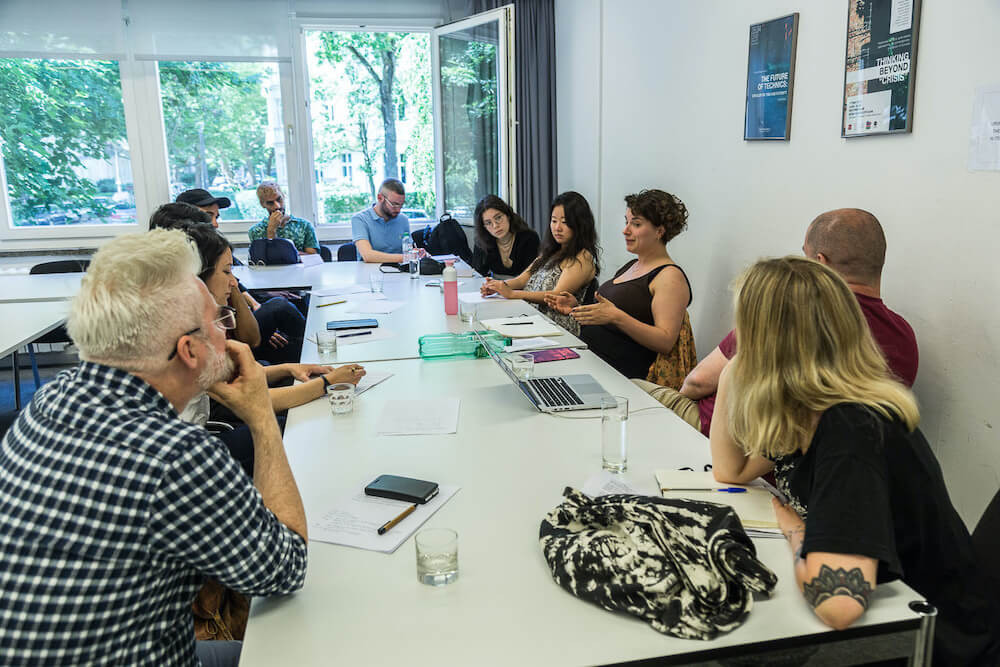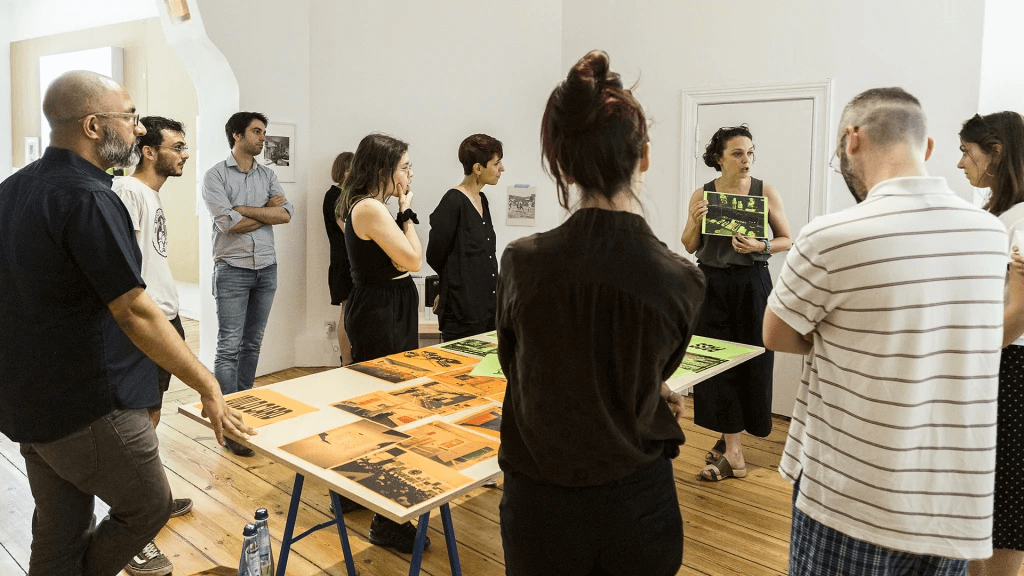Introduction to Contemporary Arts and Politics, 2025

Workshop with Prof. Dave Beech and Prof. Mick Wilson at Bard College campus Berlin, students from art & politics course, from Bard CCS, and from De Appel Curatorial Programme2018. Photo: Kjell Caminha
This summer course has been conceived as an introductory course that addresses how contemporary art (includes visual arts photography, film, and literature) interact or otherwise connect with the question of political imaginaries.
Course Approach
The student is introduced to the themes of the course through the study of concrete examples. The course adopts an inquiry-based approach so that by considering a range of situations where questions of art and questions of politics intersect we seek to gradually build a wider model or structural account of relations between these. The course is therefore not premised on a pre-resolved theory of “art and politics”. Instead it provides a survey of instances where themes and questions of politics and the political, and of art and the aesthetic, intersect. Among the concepts tested in this inquiry-based approach is that of the political imaginary. However, as an associated initiative of CAPIm the course is driven by an open research agenda, rather than a resolved theoretical position.
Topics covered in the course have included: competing accounts of the political/politics; different readings of the emergence of the aesthetic within colonial-modernity; the nature of exhibition; the geopolitics of the art world’s globalism(s); feminism and questions of eurocentrism; ecological practices and climate change responses; the nature/meaning of the construct”the political imaginary”; the shift from institutional critique to infrastructural activism; the tensions between “politics of representation” and “post-representational” practices; the question of the subject; modes of collectivity; and many other such themes. We introduce many themes and provide information and resources for participants to pursue further independent study on those themes that are of most interest for each.
The course interrogates the different claims for contemporary art’s political agency and political saliency, rather than accepting these at face value. Acknowledging the complex field of theoretical, critical and activist positions that operate in the interaction and conjunction of practices of art and practices of the political, the course does not claim to be comprehensive, but does seek to achieve breadth in the range of instances studied, including use of examples that are recommended by the student group itself.
The course is also closely informed by the work of the platforms: L’Internationale Online, PARSE Journal of Artistic Research, and partnerships with among others VECTOR Studio, Iasi and

Workshop with Prem Krishnamurthy and Emily Smith at K, space, Berlin,2018. Part of the Introduction to Art and Politics course meet-up in Berlin. Photo: Kjell Caminha.
Practical details
The course is delivered in English, blended (i.e., delivered online with the option to meet face-to-face) and free to EU nationals. In 2025 ut runs from 9 Jun 2025 to 31 Aug 2025 and the application period is between 17 Feb 2025 - 17 Mar 2025[MW1] . Applications are made via www.universityadmissions.se (for international applicants) and via www.antagning.se (for Swedish applicants) reference code GU-50185.
In 2025 the teaching team includes Dr. Kerry Guinan, Prof. Mick Wilson and Seda Yildiz with special guests including colleagues from: Oda Projesi (Özge Açıkkol, Güneş Savaş and Seçil Yersel), the Office for Joint Administrative Intelligence (Chris Dreier and Gary Farrelly) and Tranzit.ro/iași, (Livia Pancu and Florin Bobu) and Linda Thompson (Mid Sweden University).
Participants are normally expected to actively engage online, and to attend at least one meet-up session if feasible, and more if desired. Typically there are three face-to-face meeting opportunities, each in a different city. In 2025 these will include Iași, Romania and Chișinău, Moldova; and Gothenburg, Sweden.
In previous years these have included Berlin, Dublin, Gothenburg, Kassel, London, Stockholm, and Venice. In previous years speakers at collaborative events have included: Cătălin Gheorghe (2021), Rena Rädle & Vladan Jeremić (2021), Vladimir Us (2021), Vasyl Cherepanyn (2021), Paul O’Neill (2020), Anselm Franke (2020), Steven Henry Madoff (2020), QAYYEM (2020), Haseeb Ahmed (2019), Georgina Jackson (2019), Kathrin Böhm (London, 2018), Prem Krishnamurthy & Emily Smith (Berlin, 2018), Bonaventure Soh Bejeng Ndikung (Berlin, 2018), and Paul B. Preciado (Berlin, 2018).
Schedule (CET)
This is the draft schedule for 2025 and subject to minor adjustments.
Tuesday, 10 June, 15:00-17:30
Wednesday, 11 June, 15:00-17:30
Thursday, 12 Jun, 15:00-17:30
Tuesday, 17 June, 15:00-17:30
Wednesday, 18 June, 15:00-17:30
Tuesday, 24 June, 15:00-17:30
Wednesday, 25 June, 15:00-17:30
Thursday, 26 June, 15:00-17:30
Tuesday, 1 July, 15:00-17:30
Wednesday, 2 July, 10:00-11:30 or 13:00-14:30 or 15:30-17:00*
*Each participant attends ONE of three break out discussion groups.
Thursday, 3 July, 15:00-17:30
Tuesday, 22 to Saturday, 26 July - optional in person intensive in Iași, Romania and Chișinău, Moldova.
For those travelling the programme will be full-time. However, Part of this intensive programme will be available online for participation remotely for those not travelling.
Tuesday, 22 July, 17:00-18:30 - participation online possible
Wednesday, 23 July - All day (in person only) and 14:00-17:00 participation online possible.
Thursday, 24 July - All day (in person only) and 14:00-17:00 participation online possible.
Friday, 25 July - All day (in person only)
Saturday, 26 July - All day (in person only)
Tuesday, 29 July, 15:00-17:30
Wednesday, 30 July, 10:00-11:30 or 13:00-14:30 or 15:30-17:00*
*Each participant attends ONE of three break out discussion groups.
Thursday, 31 July, 15:00-17:30
Tuesday, 12 August, 15:00-17:30
Wednesday, 13 August, 15:00-17:30
Thursday, 14 August, 15:00-17:30
Tuesday, 19 August, 15:00-17:30
Wednesday, 20 August, 15:00-17:30
Thursday, 21 August, 15:00-17:30
Wednesday, 27 to Friday, 29 August - optional in person intensive in Gothenburg, Sweden coinciding with the CAPIm first annual research symposium. Part of this intensive programme will be available online for participation remotely.
Wednesday, 27 August, 13:00-17:00
Thursday, 28 August, 09:00-17:00
Thursday, 28 August, 18:00 -21:00 - attend CAPIm evening event (in person only).
Friday, 29 August, 10:00-18:00 attend CAPIm research annual symposium (in person only).
Related courses associated with CAPIm
This course is one of a series at Bachelor, Master and Doctoral level in a wider portfolio of initiatives associated with the Centre for Art and the Political Imaginary, including.
Introduction to Contemporary Arts and Politics, Bachelor Level (VFSPOL, 15ECTS)
On Friendship and the Political Imaginary, Masters Level (FKAKPO, 15ECTS)
Commissioning and Curating Contemporary Public Art, Masters Level (VCUR01, 30ECTS)
Researching Imaginaries, Doctoral level (KFHVA05, 7.5 ECTS)
Writing Research / Researching Writing, Doctoral level (KF3BAS1, 7.5 ECTS)
On Research Method and Research Design, Doctoral level (KF3BAS2, 7.5 ECTS)
These courses are typically blended (i.e., delivered online with the option to meet face-to-face). They are free to EU nationals, delivered in English. Each course is rooted in live research currently underway at HDK-Valand Academy of Art and Design and organised within wider networks of affiliation and partnership. It is also possible to audit one or more of these courses by becoming a guest doctoral researcher at one or other of the partner institutions in CAPIm. (More information on this aspect will be published in March 2025.)